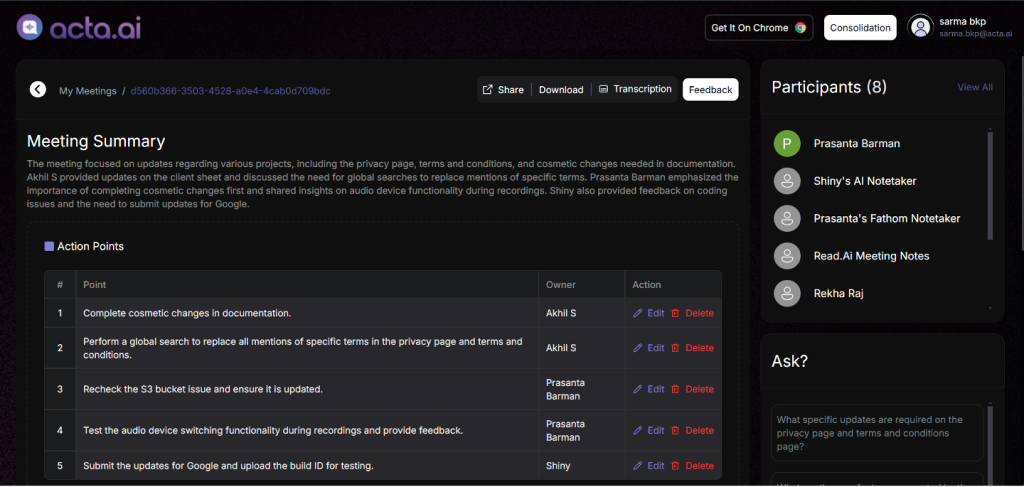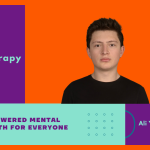While meetings shape decisions, often important discoveries are buried in many notes or forgotten entirely. Beyond transcription, Acta AI tracks action items, summarizes conversations, and even combines ideas from several sessions. Teams can remain aligned without having to do it manually, thanks to smooth interfaces, including Zoom, Microsoft Teams, and CRMs. Founder Sarma BKP talks about how his vast IT knowledge spawned Acta AI, the challenges of developing an AI-powered workflow tool, and why changing conversations into action will define workplace productivity in the future.
1. What inspired the creation of Acta AI, and how has your background influenced its development?
Sarma BKP: Acta.ai was born out of the need for an automated tool that could not only record and transcribe but also summarize and consolidate meeting minutes. Manually jotting down the meeting minutes is cumbersome. Moreover, actively contributing to the conversation while trying to take accurate notes is a challenge. The meeting recording tools that were available were either expensive or inaccurate. Thus, I set out to build a tool that was affordable and reliable.
My twenty years of IT experience have helped me identify the exact problem areas when it comes to meeting minutes. Working with industry giants like IBM, Cisco, and Ericsson has given me technical expertise and strategic insight into product development. I have channelled all this and much more towards building Acta.ai, a product that would transform the way people manage meetings.
2. With many players entering the AI-powered meeting tool space, how does Acta AI carve its niche?
Sarma BKP: Yes, there are many players in this space. But what we offer stands above the rest. We not only automate meeting minutes but also consolidate multiple meetings into a single narrative.
Imagine you have daily standup calls, weekly status calls, etc., with multiple teams. Fast-forward to year-end, by consolidating all those meetings, Acta brings everything together with a consolidated report on Achievements, goals, success stories, who worked on what activities, what challenges/risks faced, major decisions made, who contributed more, how much cost incurred for this entire year. With the help of this vast information, organizations can assess individuals or teams, perform predictive analysis and many more. As a result, Acta can help to amplify productivity collaboration and provide unparalleled insights.
3. The shift to hybrid work has reshaped collaboration. How does Acta.AI adapt to this new normal, and what role do you see it playing in shaping workplace productivity over the next decade?
Sarma BKP: When the team is spread across time zones and platforms, there is always a risk of miscommunication and lack of transparency. For this reason, it is all the more important to bring the entire team on the same page. We have built Acta.ai just for this purpose. It records, summarizes and consolidates meeting discussions into insights that can be accessed anytime, anywhere. It can be seamlessly integrated from a variety of platforms in real time, ensuring that all team members agree.
Workplace productivity is all about having a clear understanding of the developments to date and future goals. The next decade will see us adapt and innovate to fulfil the objective of supporting organisations that thrive on collaboration.
4. Acta.AI offers features like transcription, summarization, and action point tracking. Which of these has been the most impactful, and why?
Sarma BKP: Besides transcription, summarization and action point tracking, the most impactful and unique feature of Acta.ai is the consolidation of multiple meetings. This feature goes beyond just recording and transcribing. Imagine an entire year’s worth of meeting data at your fingertips that can be summarized and retrieved in an instant. Furthermore, you can pick and choose which data you would want to retrieve.
I want to add here that we are not just a transcription or summarization tool. We are an integrative tool. The valuable meeting insights that we provide will help organizations make better-informed decisions.

5. Security and compliance are critical in the AI space, especially for enterprises. How does Acta AI stay ahead in ensuring robust data protection and regulatory compliance?
Sarma BKP: We use encryption protocols like AES and 256-bit SSL/TLS to protect data. To maintain compliance, Acta.ai aligns with major regulatory frameworks such as GDPR, HIPAA, and CCPA, depending on the industry and region. Furthermore, we conduct regular SOC1 TYPE2 audits.
6. Can you share examples of how Acta AI has transformed traditional workflows in industries like sales, tech, or healthcare?
Sarma BKP: In sales, Acta.ai eliminates manual note-taking by transcribing meetings. It integrates with CRMs, updates the records and generates summaries of client interactions. This saves time and teams can focus on closing deals.
For tech teams, Acta.ai consolidates discussions from stand-ups and planning sessions. This ensures project milestones, bug fixes, and updates are well-documented. Tracking progress across multiple projects becomes easy, and all stakeholders are on the same page.
In healthcare, Acta.ai records and organizes patient case discussions and reviews, so there is no communication gap, and follow-ups are on time. A detailed record of all reports eliminates errors.
Across industries and organizations, Acta.ai helps save time and increase productivity.
7. What are some of the challenges customers face in managing meeting data, and how does Acta AI solve these issues?
Sarma BKP: There are quite a few challenges that the customers face. Data overload and white noise bury crucial information, but Acta.ai provides clear and concise summaries so that no detail is missed. Missed action points and incomplete records often lead to delays and miscommunication, which Acta.ai addresses by ensuring that teams receive complete and uniform records. Difficulty in retrieving relevant data causes a loss of valuable time, but Acta.ai keeps a centralized repository that makes searching and retrieving data easy. Limited insights into individual and team contributions make appraisals and reviews a struggle, so Acta.ai aggregates multiple records to track performances, especially in long-term projects. Additionally, manual errors can be completely eliminated with Acta.ai’s automated transcriptions and summaries.
8. What role does Acta AI’s integration with tools like Zoom, Microsoft Teams, and Confluence play in its success? Are there additional integrations on the horizon?
Sarma BKP: Integration with widely used platforms like Zoom, Google Meet, Microsoft Teams, and Confluence allows users to leverage Acta.AI without leaving their preferred tools. This seamless workflow minimizes disruption and encourages adoption.
We have plans to integrate other major CRMs and project management applications.
9. What have been the biggest challenges in scaling Acta AI, and how did you overcome them?
Sarma BKP: Handling increased workloads efficiently has been a challenge. As we expand and hold more users, we find increased demand for storage and data security. To address this, we have implemented a cloud-based scalable infrastructure.
Effective market penetration has been yet another challenge. The competition is intense. Reaching the right audience and differentiating Acta.ai from similar products is crucial. We focus on a customer-centric approach, addressing them through targeted marketing campaigns. Referrals from satisfied clients are the most effective strategy for expanding market reach.
10. Reflecting on your journey as a founder, is there a past decision or strategy you would approach differently with the knowledge you have now?
Sarma BKP: Direct user feedback and customer interviews would have given us a better perspective during the development stage. Also, investing more resources in marketing and branding would have helped in market penetration.
11. What does success look like for you and Acta AI in the next 5–10 years?
Sarma BKP: In the next few years, we see ourselves providing affordable solutions to institutions and smaller businesses. Success for us would be to go beyond meeting minutes and provide features like predictive analysis and real-time decision assistance.
12. What does a typical day in your life as a founder look like, and how do you stay focused and inspired?
Sarma BKP: For any founder, a typical day is a blend of problem-solving and creative thinking. Mine is no different. Engaging with partners, stakeholders and customers takes up most of the day, while the rest goes into planning future strategies. I also ensure that I take some time off to pursue my hobbies. This helps me stay connected and focused.
Editor’s Note
The meeting should not just happen but also have a long-term impact, claims Sarma BKP. Designed to help companies monitor decisions, calculate contributions, and simplify processes, Acta AI is From sales teams gathering customer contacts to IT directors managing challenging projects and healthcare professionals organizing patient interactions, Acta AI is changing how teams interact in their communications. Realizing the vision will make meetings a strategic advantage.


